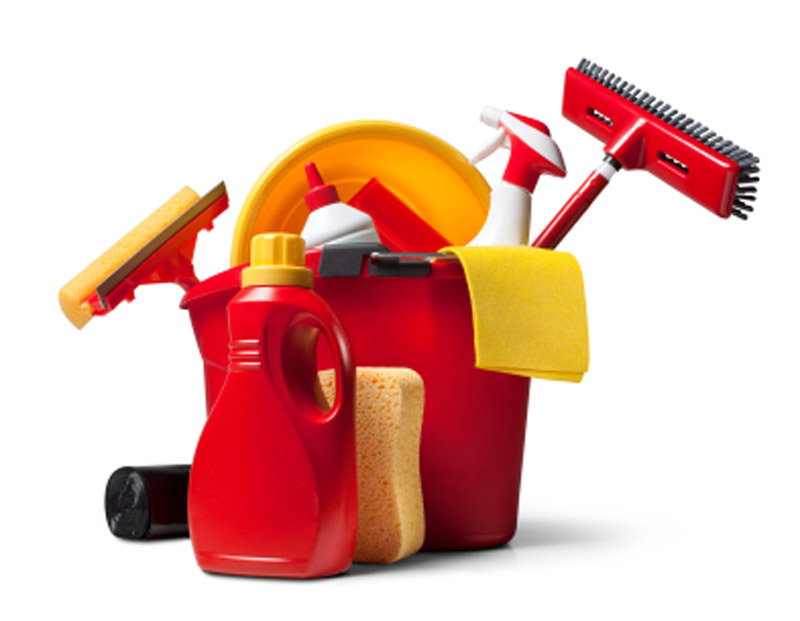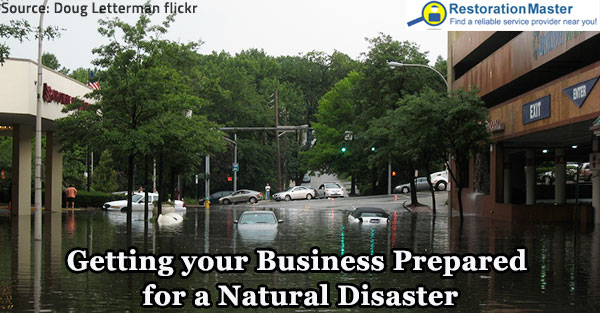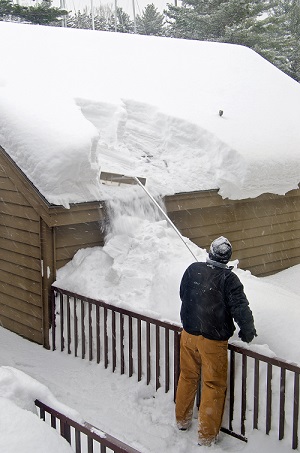Fire Safety Tips for Major Household Appliances
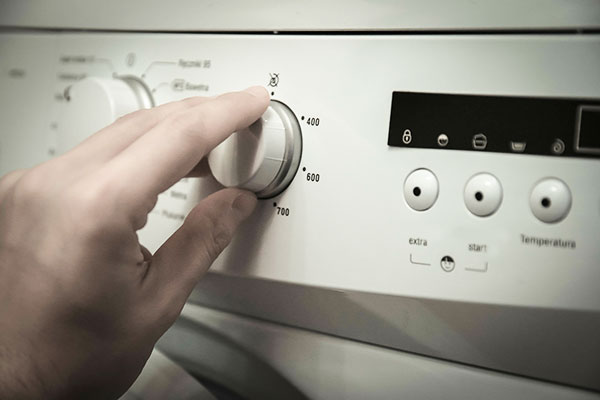
Modern day appliances make our lives easier and quite convenient.
One can hardly imagine life without the numerous conveniences brought by modern day technology and cutting edge equipment. Even simple everyday chores, such as washing the dishes, are now done with the help of advanced tools and devices. All the electrical gadgets and appliances we use on daily basis, however, are double-edge swords – they render our lives easier and more enjoyable, but also significantly increase the electrical fire hazards in the home.
According to the U.S. Fire Administration, the number of electrical fires in the United States exceeds 25,000 a year. As devastating as they may be though, most of these residential fires can be efficiently prevented by certain simple precautionary measures. In fact, all you need to do in order to ensure appliance fire safety is keep your household equipment in good working order and use it with care.
So, to reduce the risk of appliance fires to a minimum, make sure you follow the essential fire safety tips below.
General Home Fire Safety Tips
The following preventionPrevention refers to actions taken to reduce the likelihood ... More practices will help you ensure home fire safety and prevent terrible disasters:
Regular Inspection and Maintenance
Keep the electrical appliances and electrical system in your home in good repairRepair is the act of fixing or restoring damaged property, m... More:
- Check your home’s wiring on a regular basis. If you notice flickering lights, light switches that are hot to the touch, or outlets that don’t work, call an electrician to inspect and fix the problems as soon as possible. Also, have in mind that the electrical systems in older homes may not be suitable for modern appliances and you may have to upgrade the wiring in order to avoid the potential risk of fire;
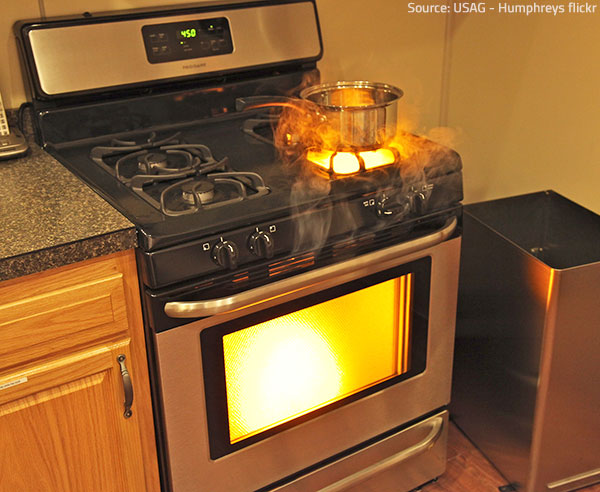
You need to take adequate precautions to ensure the electrical fire safety in your home.
- Inspect power cords. Replace or repairRepair is the act of fixing or restoring damaged property, m... More frayed, worn out, or otherwise damaged wires without delay;
- Fix malfunctioning appliances immediately. If an appliance sparks or sputters or gives you a shock when running, have it repaired at the earliest opportunity;
- Make sure all the air ducts, vent pipes, etc. in your home are clear and not restricted in any way;
- Keep all your household appliances clean and free of debris.
Proper Location
Find an appropriate location for each and every appliance in your home:
- Keep electrical appliances at a safe distance from wet areas, especially in the kitchen, bathroom, or basement;
- Keep furniture, curtains, towels, bedding and any other flammable materials, such as clothing or newspapers at least three feet away from household appliances;
- Install the appliances in your home on a solid, level surface (flat and inflammable). For maximum safety, avoid placing carpets, mats or rugs under the appliances;
- Find safe locations for the appliances in your home – away from doorways and high-traffic areas.
Proper Power Supply
Be careful when powering your household appliances:
- Be careful not to overload the outlets. Don’t plug too many appliances into the same electrical outlet, extension cord, or power strip. Consider using power strips equipped with internal overload protection – they will shut off when overloaded, preventing potential problems;
- Plug electrical appliances into grounded wall sockets. Make sure the outlet can handle the electric load required by every individual appliance;
- Avoid using extension cords as a permanent solutionA solution is a homogeneous mixture of two or more substance... More for powering appliances. When this can’t be avoided, use heavy-duty extension cords meant specifically for large appliances;
- Never force an appliance with a three-prong plug into a two-prong outlet or extension cord;
- Replace frayed, tattered or worn out cords as soon as you notice them;
- Never run cords under carpets or rugs.
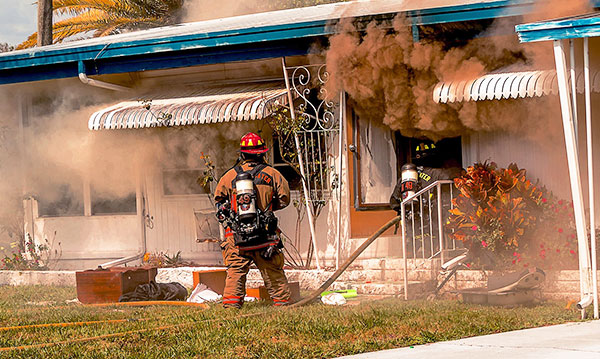
Being careful and alert can mean the difference between home fire safety and a home fire.
Careful Usage
Improper usage of electrical appliances may result in severe problems, including house fires. So, make sure you:
- Never leave an appliance running if unattended (when everyone is in bed or has left the house);
- Use appliances for their intended uses only (do not dry clothes on the radiator, or sterilize baby bottles in the microwave, for example);
- Unplug appliances when not using them.
Good to remember:
- Install fire alarms and smoke detectors throughout your home. Test them regularly and supply fresh batteries when necessary;
- Keep a small fire extinguisher that is suitable for use in electrical fires near every major appliance in your home;
- In the event of a fire, call professional fire damage restoration specialists without delay – they will prevent the sootSoot is fine black particles composed of carbon and other ma... More and smoke from causing further damage to your property and will restore the good condition of your home in a quick and efficient manner.
Appliance Fire Safety Tips
Every piece of equipment that operates on electricity or gas presents safety risks. In addition to the above described general safety tips, you need to take some special precautionary measures for every individual appliance in your home.
How to Prevent Washing Machine Fires
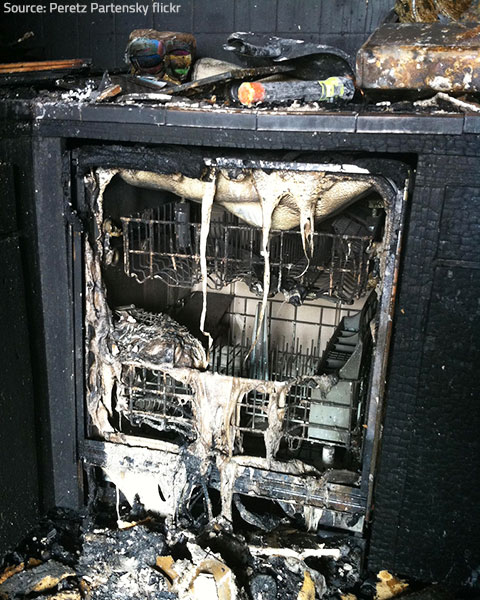
Not what your dream kitchen looks like, right?
1) Make sure your washing machine is properly connected and grounded;
2) Strictly follow the manufacturer’s operating instructions when using your washing machine;
3) Do not overload your washing machine;
4) Make sure the plastic components on the interior of the door responsible for releasing the detergent are in good repairRepair is the act of fixing or restoring damaged property, m... More – if faulty, they may cause water to leak over the machine’s internal wires, resulting in a fire;
5) Make sure clothes that have come in contact with flammable substances, such as gasoline, paint thinner, or other chemical solvents, are fully dry before washing them.
How to Prevent Clothes Dryer Fires
1) Make sure your tumble dryer is properly connected and grounded;
2) Opt for metal vent pipes to ensure proper air flow;
3) Make sure the air exhaust vent pipe is not restricted and the outdoor vent flap can open freely. Clean the lint out of the vent pipe at least once a year;
4) Never use your dryer without a lint filter. Clean the lint filter before or after each use and carefully remove the lint that has collected around the drum;
5) Don’t overload your clothes dryer;
6) Never use your tumble dryer to dry items soaked with flammable liquids, like cooking oil, gasoline, paint thinner, or alcohol.
Good to remember: Have gas dryers regularly inspected by a qualified professional to make sure that the gas line and connection are intact and free of leaks.
How to Prevent Dishwasher Fires
1) Check for leaks on a regular basis and fix them immediately as moisture coming in contact with the wires can easily result in a fire;
2) Make sure the plastic components that release the dishwashing agent are in excellent condition (so that they don’t cause water to leak over the dishwasher’s internal wires and start a fire).
How to Prevent Cooking Range Fires
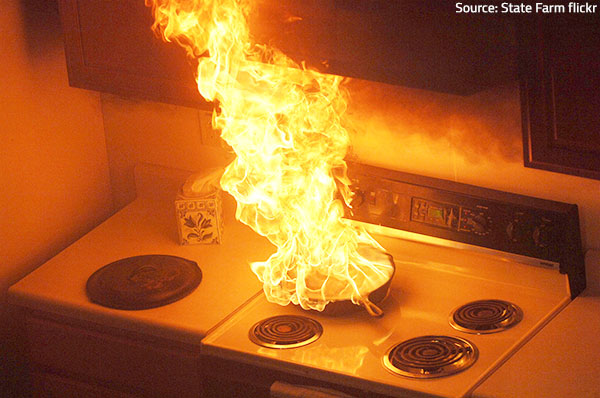
You should be careful when cooking or it will not be just your food that will be overdone, but your kitchen as well…
Cooking activities are among the main causes of electrical fires, so you need to be extra careful when using your electric or gas range:
1) Make sure the oven and the hood are safely connected;
2) Install safety devices such as stove safety guards, stove knob stops, and stove locking straps, especially if you have young children;
3) Keep the stove top and oven clean and free of grease and other flammable debris;
4) Be careful and alert when frying, grilling, boiling, or broiling;
5) Turn pot handles inward to avoid knocking a pot off the stove;
6) Roll up your sleeves, wear non-slip footwear, and tie back your hair when cooking;
7) Before using your gas range, make sure it doesn’t smell of gas. If it does, open a window and call a professional to take care of the problem as soon as possible;
8) Don’t store anything in the oven and don’t forget to check if it’s empty before using it;
9) Never pour water over a grease fireA grease fire is a fire that occurs when cooking oils or fat... More as this will make the flaming oil spread even faster and more violently. Use a powder fire extinguisher, baking soda, salt or a wet rag to put off the flames;
10) Install a smoke alarm especially designed for kitchens, so that it is not triggered by normal cooking activities.
How to Prevent Fridge Fires
1) Your fridge or freezer has to be plugged in at all times in order to function, so make sure it is powered as safely and efficiently as possible and the power cord and electrical outlet are in excellent condition;
2) Clean the back of the fridge or freezer regularly, as one of the most common causes of fridge fires is the accumulation of dirt at the back of the appliance.
How to Prevent Space Heaters Fires
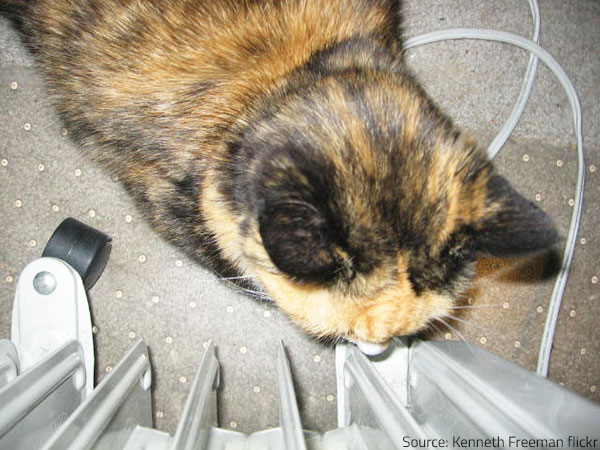
What are you so curious about? How to start a radiator fire?
1) Place electric heaters on a stable level surface where they can’t be knocked over easily. Avoid putting a heater, even if it is a small one, on tables, chairs, cabinets or any other furniture pieces;
2) Do not use space heaters in the bathroom and keep them away from water;
3) Never touch the heater with wet hands to reduce the risk of electrical shock;
4) Check regularly if the cord, plug, and wall outlet are hot to the touch. If they are, unplug the heater immediately and have it inspected by a professional;
5) Supervise children and pets when a heater is running, not only because they may knock it down, but also because they may touch the heating element or the hot surface and get burnt.
To ensure electrical fire safety, you are recommended to register newly bought appliances on the manufacturer’s website – this way, you will receive updates on safety information about your household appliance, as well as notifications if the product is recalled.










